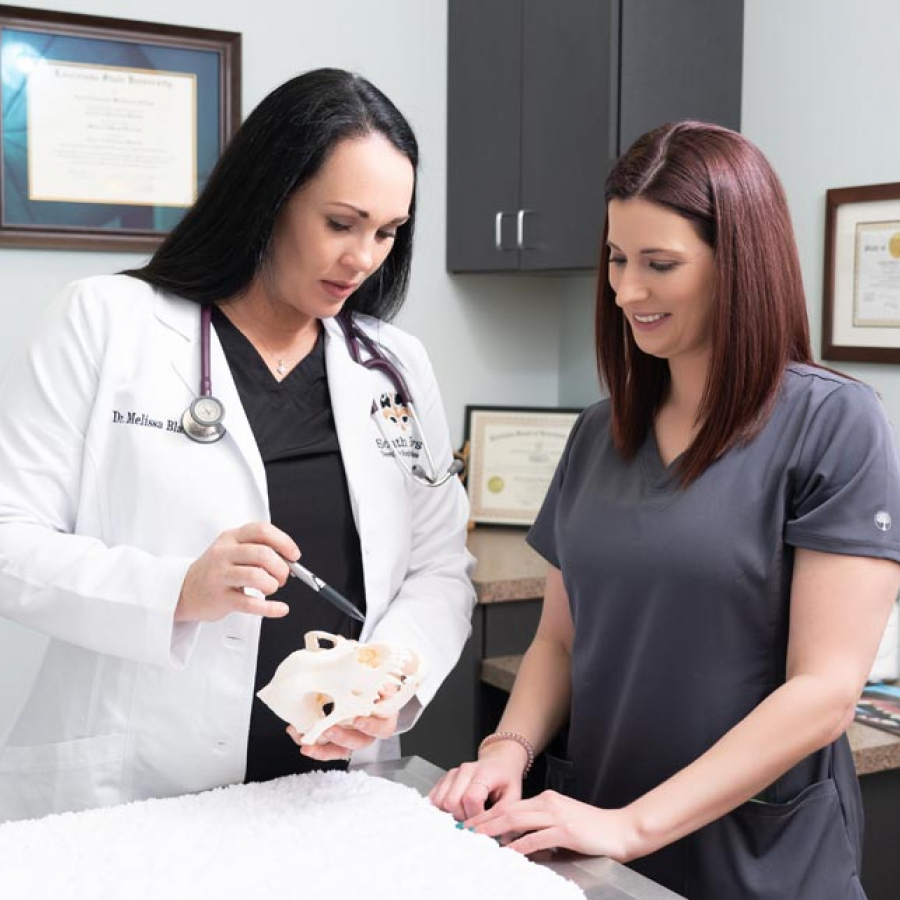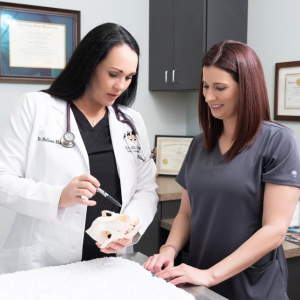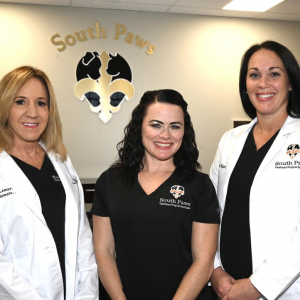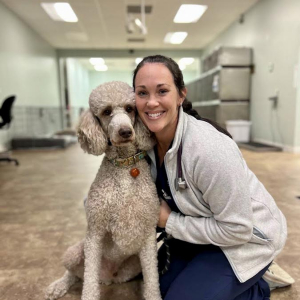Dr. Melissa Blazevich, DVM grew up on a farm where her love for animals blossomed. She enjoyed caring for all the animals, but especially the cows and horses on her father’s farm. She was later inspired by the late Dr. Robert “Bob” Hancock, who founded South Paws Veterinary Surgical Specialists with his wife, Jennifer. Dr. Melissa served as a Registered Veterinary Technician at South Paws in Mandeville before attending veterinary school. Dr. Melissa always knew she wanted to return to South Paws upon completion of her specialty training to uphold Dr. Bob’s legacy and to continue to offer the highest quality care based on the mission upon which South Paws was founded: “Healing Hands with a Passion for Paws.”
During her freshman year at Southeastern Louisiana University, she made the decision to commit to a career in veterinary medicine. She graduated from Louisiana State University School of Veterinary Medicine in 2016, where she developed a strong interest in veterinary dentistry. After graduation, she completed a rigorous one-year small animal rotating internship at Texas A&M University, followed by a three-year residency in Veterinary Dentistry and Oral Surgery at Gulf Coast Veterinary Specialists in Houston, Texas.
Dr. Melissa explains, “Dentistry and oral surgery is a very specialized area. When I was a student at LSU, there was not a dentistry program during my clinical rotations, so I went to Houston to complete an externship. After going through the rotation in dentistry and oral surgery, I immediately knew I had found my niche. As this specialty grows. we can learn more and treat more. Returning to South Paws to offer dentistry and oral services in October of 2020 felt like coming home.”
Dental health is a very important part of your pet’s overall health, and dental problems can cause pain and oral discomfort. Your pet’s teeth and gums should be checked at least once a year by your veterinarian to look for early signs of a problem and to keep your pet’s oral cavity healthy.
Dr. Melissa says most of her clients don’t realize dentistry and oral surgery specialties exist until their pet is in need. Her services are the first of their kind on the Northshore. “Primary care veterinarians refer their patients to me for specialty services such as a difficult tooth extractions, fractured tooth, oral cancer, or maxillofacial trauma, such as getting hit by a car. While many veterinarians do general dental cleanings, I offer the full gamut of advanced periodontal therapy, dental care, and oral surgery. I begin with a complete dental cleaning, an oral exam which includes full mouth probing. and a complete set of X-rays. If treatment is needed such as a tooth extraction, it can be done immediately all within one anesthetic procedure.”
Periodontal disease is the most common dental condition in dogs and cats. By the time your pet is three years old, he or she will likely have some early evidence of periodontal disease, which will worsen as your pet grows older if effective preventive measures aren’t taken. Early detection and treatment are critical, because advanced periodontal disease can cause severe problems and pain for your pet.
It’s better to be proactive than reactive, so amenable pet owners should brush their pet’s teeth daily if possible. Most dogs accept brushing, but cats can be a bit more resistant, so patience and training are important. There are many chews on the market, such as antlers, that can actually fracture teeth, so avoid hard objects and chews if possible! Oravet or Greenies dental chew treats and special dental diets can promote oral hygiene. When pets have pungent halitosis, refuse to eat hard foods, exhibit a change in behavior such as becoming irritable, or they may even hold their head sideways when chewing, it can indicate an infection or dental problem. Most geriatric pets need dental care but owners worry about putting their fur baby under anesthesia. Although anesthesia always has risks, it’s safer now than ever and the risks are very low and are far outweighed by the benefits. This area is Dr. Melissa’s forte as she frequently works with geriatric pets so owners can rest assured that their baby is in good hands.
Dr. Melissa says, “Some of my favorite patients are police dogs. Bite work is essential in their line of duty, so they’ll come in for a fractured tooth to receive root canal therapy. My goal is to protect the affected tooth so that the Officer is able to return to work and do their job without pain or discomfort.” She also enjoys working on cats and has worked on larger animals in a zoo setting. “l love big cats! It would be a great goal achieved if I could work on Mike the Tiger!”
In her spare time, Dr. Melissa loves to work out, spend time outdoors, travel, and attend LSU athletic events. She enjoys farm life with her family, three dogs, and four goats.
During her freshman year at Southeastern Louisiana University, she made the decision to commit to a career in veterinary medicine. She graduated from Louisiana State University School of Veterinary Medicine in 2016, where she developed a strong interest in veterinary dentistry. After graduation, she completed a rigorous one-year small animal rotating internship at Texas A&M University, followed by a three-year residency in Veterinary Dentistry and Oral Surgery at Gulf Coast Veterinary Specialists in Houston, Texas.
Dr. Melissa explains, “Dentistry and oral surgery is a very specialized area. When I was a student at LSU, there was not a dentistry program during my clinical rotations, so I went to Houston to complete an externship. After going through the rotation in dentistry and oral surgery, I immediately knew I had found my niche. As this specialty grows. we can learn more and treat more. Returning to South Paws to offer dentistry and oral services in October of 2020 felt like coming home.”
Dental health is a very important part of your pet’s overall health, and dental problems can cause pain and oral discomfort. Your pet’s teeth and gums should be checked at least once a year by your veterinarian to look for early signs of a problem and to keep your pet’s oral cavity healthy.
Dr. Melissa says most of her clients don’t realize dentistry and oral surgery specialties exist until their pet is in need. Her services are the first of their kind on the Northshore. “Primary care veterinarians refer their patients to me for specialty services such as a difficult tooth extractions, fractured tooth, oral cancer, or maxillofacial trauma, such as getting hit by a car. While many veterinarians do general dental cleanings, I offer the full gamut of advanced periodontal therapy, dental care, and oral surgery. I begin with a complete dental cleaning, an oral exam which includes full mouth probing. and a complete set of X-rays. If treatment is needed such as a tooth extraction, it can be done immediately all within one anesthetic procedure.”
Periodontal disease is the most common dental condition in dogs and cats. By the time your pet is three years old, he or she will likely have some early evidence of periodontal disease, which will worsen as your pet grows older if effective preventive measures aren’t taken. Early detection and treatment are critical, because advanced periodontal disease can cause severe problems and pain for your pet.
It’s better to be proactive than reactive, so amenable pet owners should brush their pet’s teeth daily if possible. Most dogs accept brushing, but cats can be a bit more resistant, so patience and training are important. There are many chews on the market, such as antlers, that can actually fracture teeth, so avoid hard objects and chews if possible! Oravet or Greenies dental chew treats and special dental diets can promote oral hygiene. When pets have pungent halitosis, refuse to eat hard foods, exhibit a change in behavior such as becoming irritable, or they may even hold their head sideways when chewing, it can indicate an infection or dental problem. Most geriatric pets need dental care but owners worry about putting their fur baby under anesthesia. Although anesthesia always has risks, it’s safer now than ever and the risks are very low and are far outweighed by the benefits. This area is Dr. Melissa’s forte as she frequently works with geriatric pets so owners can rest assured that their baby is in good hands.
Dr. Melissa says, “Some of my favorite patients are police dogs. Bite work is essential in their line of duty, so they’ll come in for a fractured tooth to receive root canal therapy. My goal is to protect the affected tooth so that the Officer is able to return to work and do their job without pain or discomfort.” She also enjoys working on cats and has worked on larger animals in a zoo setting. “l love big cats! It would be a great goal achieved if I could work on Mike the Tiger!”
In her spare time, Dr. Melissa loves to work out, spend time outdoors, travel, and attend LSU athletic events. She enjoys farm life with her family, three dogs, and four goats.
Tagged in What's Up Doc in our Spring 2022 issue






